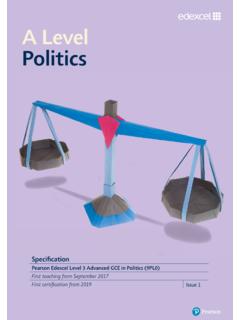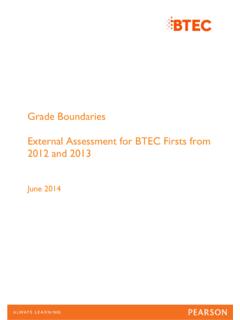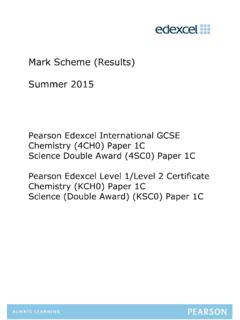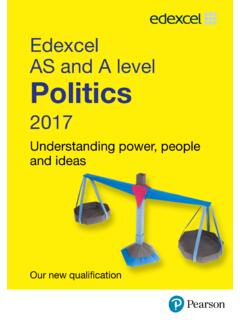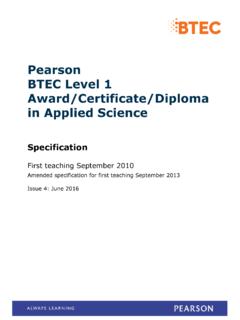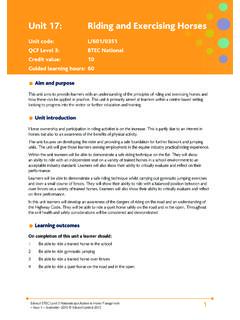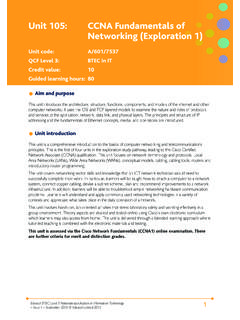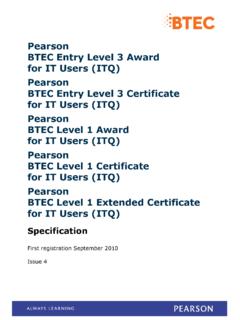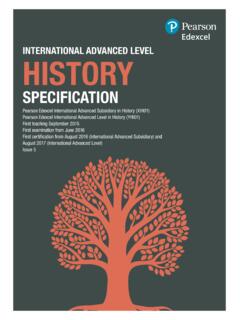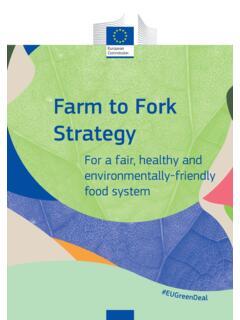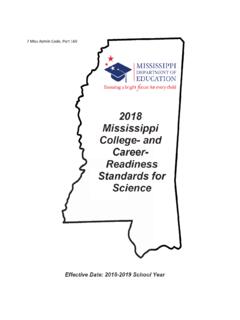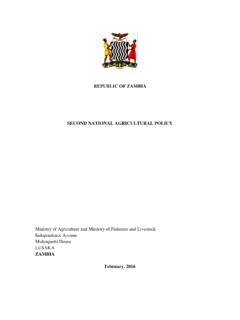Transcription of Unit 1: Understand the Principles of Sustainable ... - Edexcel
1 Edexcel BTEC Level 3 Nationals specification in Environmental Sustainability Issue 1 February 2011 Edexcel Limited 20111 Unit 1: Understand the Principles of Sustainable DevelopmentUnit code: R/600/9864 QCF Level 3: BTEC NationalCredit value: 10 Guided learning hours: 60 Aim and purposeThis unit aims to provide learners with an understanding of the Principles of Sustainable development and how these can be applied in practice. This unit is primarily aimed at learners within a centre-based setting looking to progress into the sector or further education and training. Unit introductionIt is now commonly accepted that there is a need to ensure that human activities do not cause permanent damage to the environment, thereby denying resources to future generations.
2 Economic and social goals should be achieved in ways that can be supported in the long term by conserving resources, protecting the environment and ensuring human health and welfare. In order to achieve these goals, those employed in environment conservation and management should have knowledge and understanding of the concept of Sustainable development and an appreciation of the main mechanisms for its unit gives learners an opportunity to study the core themes and issues of Sustainable development. It raises awareness of Sustainable issues, responsibility and citizenship, the needs of others both now and in the future, and the requirement to respect and value the diversity of will gain awareness of what is being done globally, nationally and locally to achieve sustainability and how the industry can play a role in achieving these outcomesOn completion of this unit a learner should.
3 1 Understand the Principles of Sustainable development2 Understand resource and environmental management in relation to Sustainable development3 Know how economics and society contribute to Sustainable development4 Understand methods in use to implement Sustainable BTEC Level 3 Nationals specification in Environmental Sustainability Issue 1 February 2011 Edexcel Limited 20112 Unit content1 Understand the Principles of Sustainable developmentDefinition: the concept of Sustainable development (Brundtland Report, Agenda 21), Sustainable development themes (social, economic and environmental)Earth and humans: Gaia hypothesis; evolution; human population growth; agricultural development; the industrial revolution; resource consumption and pollution; development of local and global transport systemsLegislation and policies: development of international conventions and protocols related to Sustainable development since the 1970s eg Climate Change Convention, Kyoto Protocol, Copenhagen Accord, UK legislation (Environment Act, Climate Change Act, Planning Acts, UK Government policies and guidance from Department for Environment, Food and Rural Affairs (Defra) and Department of Energy and Climate Change (DECC)).
4 Methods used to try to ensure countries adhere to the agreed Principles eg political pressure, Earth Summits2 Understand resource and environmental management in relation to Sustainable developmentEnvironmental systems: essential requirements for plant and animal life eg air, water, sunlight, space; basic biogeochemical cycles eg hydrological cycle, carbon cycle; basic population dynamics; food webs; predator/prey relationships; finite (non-renewable) and renewable resourcesState of the environment: effects of human activities on the environment (air, water, land) eg pollution, use of natural resources, replanting forests; natural environmental changes (catastrophic, gradual); importance of sustaining the wealth of biological diversity (biodiversity) available to humans; current problems affecting biodiversity eg habitat destruction, pollution, invasive species; current biodiversity initiatives and their effectiveness eg UK Biodiversity Action Plan; carrying capacity concept; the concept of resource substitution, resource efficiency and conservationAgriculture, fisheries and forestry: the challenges of Sustainable development; issues relating to feeding a growing population; Sustainable farming methods; genetic diversity of crops; issues facing forests in the developing world eg agricultural expansion, overgrazing, commercial logging, deforestation.
5 Sustainable forestry eg species diversity, provision of wildlife refuges; issues relating to supplying fish protein to an expanding global human population eg overfishing of wild stocks, marine and freshwater pollution; Sustainable aquaculture developments eg choice of species, artificial diet development3 Edexcel BTEC Level 3 Nationals specification in Environmental Sustainability Issue 1 February 2011 Edexcel Limited 20113 Know how economics and society contribute to Sustainable developmentInvestment, competition and stability: importance of the development of skills, lifelong learning and environmental protection; indicators of competitiveness eg availability of human, natural or technological capital; levels of innovation, entrepreneurship and economic stability; adoption and awareness of concepts (eco-efficiency, eco-footprint, ecosystem services, environmental capacity, recycling, interdependence, preferable futures, uncertainty and precaution)Society: the rights of a citizen and the responsibilities that go with those rights; the impact that activities have on the environment (locally, globally) eg eco-footprint; methods of participation in the local and global community to achieve a more Sustainable lifestyle.
6 The roles and responsibilities of stakeholders (Government, business, schools, colleges, households and each individual); the difference between standard of living and quality of life ; factors that influence the quality of life locally and globally; methods of improving the quality of life locally and globally; the link between actions taken today (consumer choice) and the impact for future generations; methods of reducing impact on the environment and the use of natural resources; reasons for such restraint, why it is necessary and why it matters4 Understand methods in use to implement Sustainable developmentAgenda 21: the blueprint for sustainability in the 21st century; local and regional promotion for all; the development of societies and economies; conservation and preservation of the environment and natural resources; local Agenda 21 (community involvement, vision statements, action plans); implementation mechanismsSustainable development strategies: Sustainable development as a global issue; the United Nations Commission on Sustainable Development; UK Sustainable Development Commission; creation of a national strategy on Sustainable development eg guiding Principles , indicators, agreed priorities; implementation of strategy (UK Government Sustainable development strategy).
7 Implementation mechanisms eg Sustainable resource development plans, land-use planning, strategic development plans, development control, community strategiesEdexcel BTEC Level 3 Nationals specification in Environmental Sustainability Issue 1 February 2011 Edexcel Limited 20114 Assessment and grading criteria In order to pass this unit, the evidence that the learner presents for assessment needs to demonstrate that they can meet all the learning outcomes for the unit. The assessment criteria for a pass grade describe the level of achievement required to pass this and grading criteriaTo achieve a pass grade the evidence must show that the learner is able to:To achieve a merit grade the evidence must show that, in addition to the pass criteria, the learner is able to:To achieve a distinction grade the evidence must show that, in addition to the pass and merit criteria, the learner is able to.
8 P1 define the concept of Sustainable development M1 discuss how continued growth of the human population globally may impact on demand for global resourcesD1 evaluate the impact of a given land-based industry on the environmentP2 review the Gaia hypothesis and the human, evolutionary and global issues that impact on sustainability[IE1, 2]P3 summarise the global conventions and protocols related to Sustainable developmentP4 review methods used globally to encourage countries to agree a Sustainable policy[IE2, 3]P5 review environmental systems impacting on plant and animal life, including food webs, water and nutrient cycles, population dynamics, use of resources[IE2, 3]M2 discuss the potential impact on biodiversity of a given environmental schemeP6 evaluate the effects of human activities on the environment[IE4]P7 evaluate the integration of Sustainable development in agriculture, fisheries and forestry[IE4]5 Edexcel BTEC Level 3 Nationals specification in Environmental Sustainability Issue 1 February 2011 Edexcel Limited 2011 Assessment and grading criteriaTo achieve a pass grade the evidence must show that the learner is able to:To achieve a merit grade the evidence must show that, in addition to the pass criteria, the learner is able to:To achieve a distinction grade the evidence must show that, in addition to the pass and merit criteria, the learner is able to.
9 P8 explain how Sustainable development is affected by investment, competition and stabilityM3 discuss the social and economic benefits of a given land-based industryD2 evaluate options for improving a given land-based industry s explain the rights and responsibilities of the citizenP10 discuss the difference between standard of living and quality of life P11 explain how the behaviour of one generation impacts on the environment for future generationsP12 summarise Agenda 21M4 discuss the development of local Agenda 21 action evaluate the introduction of Sustainable development strategies.[IE4, 6]PLTS: This summary references where applicable, in the square brackets, the elements of the personal, learning and thinking skills applicable in the pass criteria.
10 It identifies opportunities for learners to demonstrate effective application of the referenced elements of the independent enquirersCT creative thinkersRL reflective learners TW team workersSM self-managersEP effective participatorsEdexcel BTEC Level 3 Nationals specification in Environmental Sustainability Issue 1 February 2011 Edexcel Limited 20116 Essential guidance for tutorsDeliveryTutors delivering this unit have opportunities to use a wide range of delivery methods, including lectures, discussions, seminar presentations, site visits, internet and/or library-based research and personal and/or industrial experience. It would be beneficial to make learners on work placements and their supervisors aware of the requirements of this unit before any work-related activities are carried out so that natur
